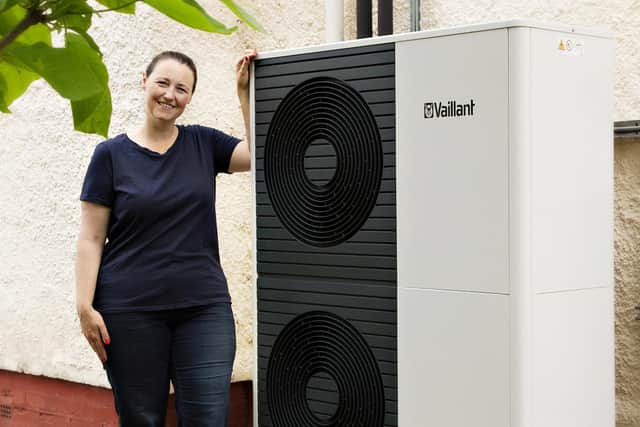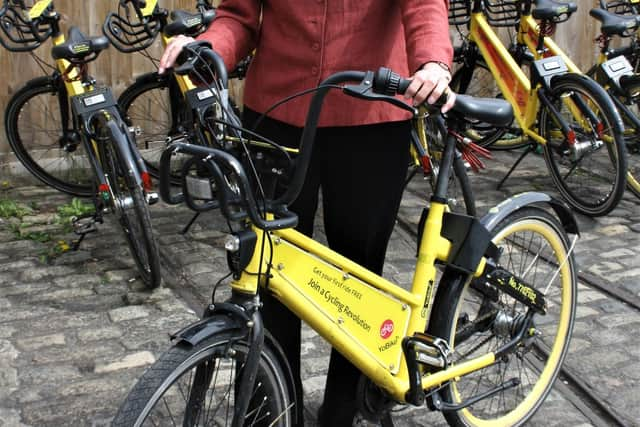Heat pump grant: Here's how the low-carbon gas boiler alternative you can get on a Government grant works
and live on Freeview channel 276
Downing Street announced this month that grants of up to £5,000 will be available for homeowners to replace their gas boilers with more environmentally friendly heat pumps.
To answer all your questions about heat pumps, The Star spoke to industry experts about what heat pumps do, how much they cost, and if they are worth it to the average homeowner.
BACKGROUND: Government offers £5,000 to replace gas boiler - who can apply, and how much heat pump costs


How do heat pumps work?
Advertisement
Hide AdAdvertisement
Hide AdAngela Terry is an environmental scientist and founder of the climate action info service One Home.
She rates heat pumps as “the best green alternative to a gas boiler” and loosely describes them as a “reverse fridge” that extracts warmth from the ground or air.
They use electricity to run, and can potentially cut your energy bills while reducing your carbon footprint.


“Air sourced heat pumps look like an air conditioning unit attached to the outside of properties,” said Angela.
Advertisement
Hide AdAdvertisement
Hide Ad"They extract warmth from the outside air then transfer it to a fluid, which is compressed to increase its temperature. The arising heat is used for both hot water and space heating, via radiators or underfloor heating systems.
"Ground source heat pumps work in a similar way but use a network of pipes in the ground to collect heat, rather than a fan, so they are more efficient but also more costly to install.”
Do heat pumps work when it’s cold outside?
Yes. In fact, Sweden has the greatest concentration of heat pumps and they are able to work in -15C.
Angela said: “It might seem unlikely that the air or the ground in Yorkshire could always be hot enough to generate enough heat.#
Advertisement
Hide AdAdvertisement
Hide Ad"But the reality is that Sweden is the country with the greatest concentration of heat pumps in the world.
"Both ground and air source heat pumps can work in temperatures as low as -15 °C. That being said, the further north you are and the colder the average outside temperature, the more likely a ground source heat pump could be the better option.”
Are heat pumps any good?
Heat pumps work best in houses that are already well insulated.
Where a gas boiler will heat water to around 75C and send that around your house’s radiators, heat pumps will heat water to around 45C.
Advertisement
Hide AdAdvertisement
Hide AdSo, if you’re having trouble heating your house on a gas boiler, it would be best to first look at insulating your home before investing in a heat pump.
Angela said: “It’s not going to be a one-size fits all solution. Some properties are going to be better suited to air source heat pumps and others to ground source.
"It depends on factors like: the size of your home, the size of your garden, if it’s a new build or older, if the installer thinks a radiator upgrade is necessary and where your home’s located.”
Are heat pumps expensive?
Heat pumps can be expensive to install.
The average cost for a heat pump is anywhere between £9,000 and £15,000. Ground works pumps are more expensive because of the cost of laying pipes.
Advertisement
Hide AdAdvertisement
Hide AdAdditionally, in a small number of cases, a homeowner will find their radiators are not suitable for the heat pump and must replace their radiators at cost.
Further, Emma Bohan, General Manager of IMS Heat Pumps, says the increasing costs of materials and shortages of skilled technicians means prices could remain high for a long time.
Combined with how the pumps best work in already insulated homes, it means heat pumps are at this time only available to homeowners already with money to spare.
Even with a £5,000 grant, lower income houses could be locked out of getting a pump.
Advertisement
Hide AdAdvertisement
Hide AdIf future legislation puts pressure on homeowners with gas boilers, in the same way that is expected with the switchover to electric cars, this could mean heavy costs in the future for low income houses who cannot afford it now.
Emma said: “There is no denying that even with the £5,000 grant, it remains more expensive to install a heat pump system over your standard gas boiler.
"However, with scares over the security of gas supplies and rising costs, homeowners are opting for heat pumps over fossil fuel heating systems, even if that means additional cost at the outset. £5,000 though will only service those with money to spare, leaving many still unable to afford the transition.”
Would I need to replace my radiators for my heat pump?
In a number of cases, a homeowner who installs a heat pump will also find they need to replace their radiators at cost.
Advertisement
Hide AdAdvertisement
Hide AdThis is because if the radiator is too small, they will not be as efficient at transferring heat to the room.
This ties further into how it is important to already have a well-insulated home before installing a heat pump.
Are heat pumps worth it?
The experts say yes.
Heat pumps are being touted as one of the best low-carbon alternatives to gas boilers and could become much more common in the future.
They are also fully capable of heating homes well combined with other insulation, and could cut your energy bills.
Advertisement
Hide AdAdvertisement
Hide AdThe trouble for now is that, even with the grant, they are largely only available to people who can afford it and want to make a difference now.
It would take a large increase in funding, availability in resources, skilled engineers and boosts to other insulating schemes to make them a normal household sight.
Angela Terry said: “The science is clear. If we are to meet our climate goals and leave a liveable world for our kids and grandchildren, our gas boilers have to go. The fossil fuels used in our homes for heating, hot water and cooking make up more than a fifth of the UK’s harmful emissions, meaning eco-friendly alternatives are essential to meeting climate targets.”
Comment Guidelines
National World encourages reader discussion on our stories. User feedback, insights and back-and-forth exchanges add a rich layer of context to reporting. Please review our Community Guidelines before commenting.